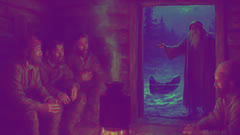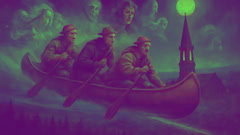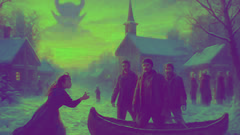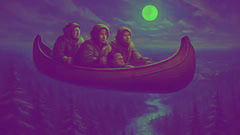Introduction
In the deep winter of Quebec, when the snow lies thick upon the pine boughs and the rivers are crusted over with shimmering ice, there are stories whispered by the flicker of the hearth. Among these tales, none are told more often, or with greater awe, than the legend of La Chasse-galerie—the flying canoe. The harsh cold binds men to the land, but it cannot freeze their longing for warmth, laughter, and loved ones far away. In the wilds north of Trois-Rivières, a group of voyageurs—hardy men of the axe and paddle—spend the long months felling timber and floating logs down the mighty rivers. Their muscles ache from toil, their spirits flag beneath endless skies, and their hearts yearn for familiar faces in distant villages. Each New Year's Eve, hope sharpens to a keen ache, and voices grow wistful as the wind howls beyond their snug, smoky cabin. To be home for the turning of the year—this is a dream so powerful it tempts the heart beyond reason. Yet in these forests, dreams can take on a life of their own, and legends find flesh and bone. There are bargains made beneath blackened branches, whispered in French amid the crackling logs, and when the moon is high and the world is hushed, even a canoe may rise from the snow and soar like a ghost above the trembling pines. This is the story of Baptiste Lapiquotte and his comrades—the night they risked everything for a single glimpse of home, only to find that the greatest dangers do not always lurk in the shadows, but within the choices we make and the promises we dare to break.
The Lonely Camp and a Whispered Pact
The camp lay buried in a hollow, deep within the Laurentian forests. Only the golden lantern light and the steady curl of smoke betrayed its presence amid the sea of snow-laden spruce. Inside the rough log shanty, a dozen men huddled around the iron stove, rough hands stretched toward the meager warmth. Shadows played on the timbered walls. Outside, wolves called to each other beneath the brittle constellations, but it was not the wild beasts that gnawed most fiercely at the voyageurs’ hearts.

Baptiste Lapiquotte, broad-shouldered and deep-chested, stirred a pot of pea soup and listened to his comrades grumble. The winter had been long—too long. Many had left sweethearts and wives behind in distant hamlets. Some hadn’t seen their parents in years. Pierre le Grand, his best friend, toyed with a wooden charm carved by his fiancée. Joseph the Bear, so nicknamed for his massive frame, sat with his back against the wall, eyes shut, humming a lullaby that had once echoed in a warm farmhouse kitchen. The youngest, Louis, stared at the icy window, his breath clouding the glass. New Year’s Eve approached, and with it a longing so sharp it made grown men ache.
After supper, stories began—tales of lost loves and daring deeds, of home and hearth. Someone uncorked a bottle of applejack. The mood grew rowdy, then quiet. Baptiste, feeling the ache of absence most keenly, said, “If only we could fly. Even just for one night. I’d give anything to be home for la veille du Jour de l’An.”
Pierre raised an eyebrow. “Anything?”
The men laughed, but Joseph’s voice rumbled low. “Careful what you promise. My grand-père said the woods listen. There are things in these forests that hear.”
The wind rattled the shutters, making them all shiver. Baptiste shrugged off the warning. “I’d make a deal with the devil himself if it meant holding Marie in my arms before the year’s out.”
A hush fell. Then, from the shadows near the door, an old man none remembered seeing before stood up. His face was long and pale, eyes deep as a winter night. “There are bargains to be made, my sons,” he said, voice thin as ice. “If your will is strong and your courage true.”
Some laughed uneasily, thinking it a trick of the drink or their own homesick minds. But when the stranger beckoned, Baptiste and his friends followed him out into the biting cold.
They gathered beneath a towering pine. The stranger produced a small bottle of fiery brandy and a black leather pouch from which he poured coarse salt in a circle around the canoe. “If you wish to travel home tonight, you must swear not to curse, not to touch a church steeple, nor spill a single drop of this sacred salt.”
Baptiste looked at Pierre, Pierre at Joseph, and all nodded. Their need burned brighter than caution. Each man took an oath—upon pain of his soul—to obey these rules. The stranger’s eyes gleamed. He made the sign of the cross backwards, and the wind stilled. “Climb in.”
The canoe shivered as they seated themselves, paddles in hand. A single word, whispered in an ancient tongue, sent the vessel lurching upward into the night sky. Trees fell away below them. The world grew small and strange as the flying canoe shot like an arrow over the snowbound wilds of Quebec.
The Midnight Flight and Devil’s Tricks
The wind rushed past their ears with a howl, and Baptiste’s heart beat so hard it nearly leapt from his chest. The canoe soared above the forest canopy, its wooden hull trembling with a power not of this world. Below, the great Laurentian wilds spread out—rivers like black ribbons, snowy valleys, clusters of distant cabins with pinprick lanterns. The moon, swollen and golden, hung low on the horizon, casting a ghostly shimmer over the land.

At first, awe overcame fear. The men clung to the sides of the canoe, hats pressed low and scarves drawn tight, eyes wide as saucers. Joseph let out a gasp as they swooped above a frozen lake where wolves skittered on the ice. Pierre laughed—a wild, reckless sound—as they twisted through clouds and dipped low over pine forests. It seemed nothing could stop them. Baptiste felt hope surge; maybe they’d truly see home tonight.
But as the canoe streaked onward, the air grew colder. Shadows danced across the snow in strange shapes. The wind began to whisper, and Baptiste realized it carried voices—familiar ones: his mother’s song, Marie’s laugh, his father’s warning. Each man heard something different, some sweet memory or sharp regret. The devil was at work, testing their resolve.
Pierre clutched his charm, eyes glazed. Joseph mumbled a prayer under his breath. Louis began to weep softly. Baptiste grit his teeth, refusing to let temptation win. But then, a dense fog rose from the valleys. They couldn’t see the land below, nor the steeples of villages ahead. The canoe rocked violently as if caught by an unseen hand.
“Careful!” cried Joseph. “Remember—the steeples!”
They paddled with frantic, silent strokes, steering clear of black silhouettes that might be church towers. The fog thickened. Pierre swore as they narrowly missed an ancient oak. Baptiste shot him a warning glare; a single curse could spell disaster. The canoe shuddered ominously.
Suddenly, the wind dropped and the canoe dipped toward a frozen river. The men dug in their paddles, fighting to stay aloft. Baptiste glimpsed a familiar bend in the water—his village! The church steeple glowed silver in the moonlight, perilously close. Sweat froze on their brows as they tilted their vessel just in time.
As they approached the outskirts of the village, the devil unleashed his final trick: the salt pouch at Joseph’s belt split open. A trail of salt tumbled into the wind. The canoe spun and pitched, a wild comet above the rooftops. Baptiste roared for calm, but the men panicked. Louis screamed as they hurtled toward the earth.
Just before they crashed, Baptiste remembered the oath. He squeezed his eyes shut and prayed—then spat a defiant curse at the darkness. The canoe jerked, halted midair, then dropped like a stone into a snowbank at the edge of the village.
For a moment, all was silent except for their ragged breaths. Above them, the moon slipped behind a cloud. The devil’s laughter faded on the wind. They’d survived—but at what cost? Their limbs ached and souls felt bruised, but the church bells rang out, welcoming the New Year. They had made it home, though their hearts bore the weight of what they’d seen and done.
Return to Earth: Redemption and the Price of Home
Snow cushioned their fall, but not their pride. The men scrambled from the canoe, shaking and battered. Baptiste knelt in the drift, clutching at his heart as the realization washed over him: they were home. The church bells pealed in the distance—twelve solemn tolls for midnight. A new year had begun.

Yet there was little time for celebration. The rules had been broken: Pierre’s curse, Joseph’s spilled salt, Baptiste’s final oath defied in desperation. Each man bore guilt like a frostbitten wound. Would the devil claim his due? Would their souls be forfeit?
The village lay silent, its houses rimmed with icicles and windows glowing amber in the cold. Baptiste rose first and staggered toward the familiar lane. He heard Marie’s voice before he saw her—soft and tremulous, calling his name as she opened the door. Baptiste ran to her, wrapped her in his arms, and wept with relief. Behind him, Pierre found his fiancée waiting at her threshold, and Joseph was greeted by the family dog, howling with joy.
Louis alone stood apart, gazing up at the church steeple as though fearing it might judge him. The others gathered round. Together they trudged to Joseph’s family home, where hot cider and laughter spilled out into the night. For a few precious hours, all felt forgiven. They ate, danced, and sang until dawn’s first pale light crept over the rooftops.
But with the morning came a reckoning. Baptiste awoke to find his boots frozen to the floor. Pierre’s hands trembled uncontrollably. Joseph’s voice was gone, reduced to a hoarse whisper. Louis looked paler than ever. The devil’s touch lingered.
The men gathered in secret by the riverbank, their canoe half-buried in snow. There they found the stranger from the camp—his eyes colder than before. “A bargain broken cannot be mended by joy alone,” he intoned. “But mercy can be found for those who repent.”
Baptiste fell to his knees and begged forgiveness—not just from God, but from each friend whose fear or folly had nearly doomed them all. Pierre and Joseph did the same. Louis finally spoke, voice quivering: “We were fools, but we are brothers. Let us face whatever comes together.”
Moved by their unity, the stranger relented. “Your souls are not lost—but remember this night always. Temptation comes to all men, but courage and love redeem even the gravest error.” With a gesture, he vanished like mist in the morning sun.
That year, Baptiste and his comrades returned to camp with lighter hearts. They spoke little of what had happened, but each man bore a mark—whether in trembling hands, a raspy voice, or haunted eyes. The legend of the flying canoe spread across Quebec, growing grander with each telling, serving as both warning and comfort.
For generations to come, voyageurs would gather on New Year’s Eve, hands clasped around mugs of cider, telling the tale of Baptiste’s wild flight: how love and longing can draw men into darkness, but how courage, repentance, and unity can bring them safely home—even if the path is carved through the sky.
Conclusion
So endures the legend of La Chasse-galerie—a story carried like the scent of woodsmoke on the winter wind, echoing wherever longing for home is strongest. Baptiste and his friends became more than mere voyageurs; their flight became a cautionary tale about the boundaries men may cross for love and belonging. The flying canoe remains a symbol of hope and danger, a reminder that our deepest wishes can open doors best left shut. Yet within this darkness flickers a brighter truth: redemption is always possible for those who choose it, no matter how far they have strayed. In the forests of Quebec, by firelight or beneath the shimmering stars, families retell this tale each New Year’s Eve—not just to warn but to inspire. For every temptation that haunts us, there is also courage to resist, and for every shadow that follows, there is friendship to light the way home.













